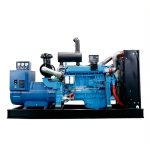Introduction
In today's modern world, the demand for electricity is increasing rapidly due to the rise in population, urbanization, and industrialization. As a result, power distribution systems face challenges in meeting the ever-growing energy requirements. To address this issue, load sharing systems are implemented to ensure a reliable and efficient distribution of electricity. Diesel generators play a crucial role in load sharing by providing backup power during peak demand periods or in case of power grid failures. This article explores the importance of diesel generators in load sharing, their working principles, benefits, and applications in various industries.
Importance of Load Sharing
Load sharing is a critical aspect of power distribution systems, especially in scenarios where the demand for electricity fluctuates or exceeds the capacity of the grid. In such situations, load sharing systems help in optimizing the distribution of power among multiple sources to ensure a stable and reliable electricity supply. By sharing the load among different power sources, the overall system efficiency is improved, and the risk of power outages is minimized.
Diesel generators are commonly used in load sharing systems due to their reliability, efficiency, and cost-effectiveness. These generators can quickly ramp up or down to meet varying load demands, making them ideal for applications where a consistent power supply is essential. In addition, diesel generators can be easily integrated into existing power distribution systems, providing a seamless backup solution during emergencies or grid failures.
Working Principles of Diesel Generators in Load Sharing
Diesel generators operate on the principle of converting chemical energy stored in diesel fuel into mechanical energy through combustion. This mechanical energy is then converted into electrical energy using an alternator, which generates electricity. In load sharing systems, multiple diesel generators are synchronized and connected to a common busbar to collectively supply power to the load.
The load sharing process involves monitoring the electrical load on each generator and adjusting their output accordingly to maintain a balanced distribution of power. This is achieved through a control system that communicates with each generator to regulate their speed, fuel supply, and output voltage. By continuously monitoring the load demand and adjusting the generator outputs in real-time, load sharing systems ensure a stable and reliable power supply to the load.
Benefits of Diesel Generators in Load Sharing
1. Reliability: Diesel generators are known for their reliability and durability, making them a preferred choice for load sharing applications. These generators can operate continuously for long durations without compromising performance, ensuring a consistent power supply to the load.
2. Efficiency: Diesel generators are highly efficient in converting fuel into electricity, resulting in lower fuel consumption and operating costs. By sharing the load among multiple generators, the overall system efficiency is improved, leading to cost savings and reduced environmental impact.
3. Quick Response: Diesel generators have a fast startup time and can quickly ramp up to full capacity within seconds. This quick response time is essential in load sharing systems to meet sudden changes in load demand and prevent power outages.
4. Scalability: Diesel generators can be easily scaled up or down to meet varying load requirements. By adding or removing generators from the load sharing system, the capacity can be adjusted to accommodate changing demand patterns, ensuring optimal performance and reliability.
5. Backup Power: Diesel generators serve as a reliable backup power source in case of grid failures or emergencies. By integrating diesel generators into load sharing systems, critical facilities can maintain uninterrupted power supply and prevent costly downtime.
Applications of Diesel Generators in Load Sharing
Diesel generators are widely used in various industries and applications for load sharing to ensure a reliable and efficient power supply. Some common applications include:
1. 200kw diesel generator for emergency backup Centers: Data centers rely on continuous power supply to operate critical IT infrastructure and servers. Diesel generators are used in load sharing systems to provide backup power during utility outages and maintain uninterrupted operations.

2. Hospitals: Hospitals require a reliable power supply to operate life-saving equipment and medical devices. Diesel generators are essential in load sharing systems to ensure continuous power supply during emergencies and power grid failures.
3. Telecommunications: Telecommunication networks depend on a stable power supply to maintain connectivity and communication services. Diesel generators play a vital role in load sharing systems to provide backup power and prevent service disruptions.
4. Manufacturing Plants: Manufacturing plants often have high energy demands that fluctuate throughout the production process. Diesel generators are used in load sharing systems to optimize power distribution and ensure consistent operation of critical machinery.
5. Commercial Buildings: Commercial buildings, such as offices, retail stores, and hotels, require a reliable power supply for lighting, HVAC systems, and other electrical loads. Diesel generators are employed in load sharing systems to provide backup power and maintain business continuity.
Conclusion
In conclusion, diesel generators are indispensable in load sharing systems for ensuring a reliable and efficient distribution of electricity. These generators offer numerous benefits, including reliability, efficiency, quick response time, scalability, and backup power capabilities. By integrating diesel generators into load sharing systems, industries and critical facilities can maintain uninterrupted operations, prevent costly downtime, and ensure a stable power supply. As the demand for electricity continues to rise, diesel generators will play a crucial role in meeting the energy requirements and enhancing the resilience of power distribution systems.
